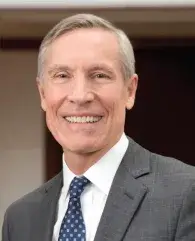From the President

In a recent meeting with a new Academy member, I was reminded of a quote attributed to Seamus Heaney (paraphrasing Václav Havel): “Hope is not optimism, which expects everything to turn out well, but something rooted in the conviction that there is good worth working for.” As I reflect on the past year, I believe this passage captures the spirit of the Academy. Immense challenges like political polarization, inequality, and climate change will not improve with wishful thinking. However, when we combine the vast intellect, diversity, and creativity of Academy members with the sort of hope that ignites action, we will make positive change.
I am deeply grateful for the commitment of so many members who participate in the Academy’s work. As you review the progress detailed in these pages, please join me in thanking them for the time, effort, and expertise that make these important initiatives possible.
I also want to acknowledge that even the best ideas and intentions stall without the fuel to drive them forward. This year, the Academy passed a major milestone by completing the Campaign for the Academy and Its Future. The primary goals of the campaign were to support the work of the Academy today and to provide a more financially sustainable future. We have done so. The Campaign raised over $110 million, 10 percent over the goal, and six months ahead of schedule. As you will read in the pages that follow, this funding made the important projects, publications, and convenings that we have undertaken over the past seven years possible. It also increased the size of our endowment and established a deferred giving program that will help provide for the future aspirations of the Academy. We are grateful to the many members and foundations who contributed so generously to this effort. We are also indebted to Louise Henry Bryson and David M. Rubenstein, whose leadership as Campaign cochairs set a new standard for what the Academy can accomplish.
Thank you for all you do to support the American Academy of Arts and Sciences.
David W. Oxtoby